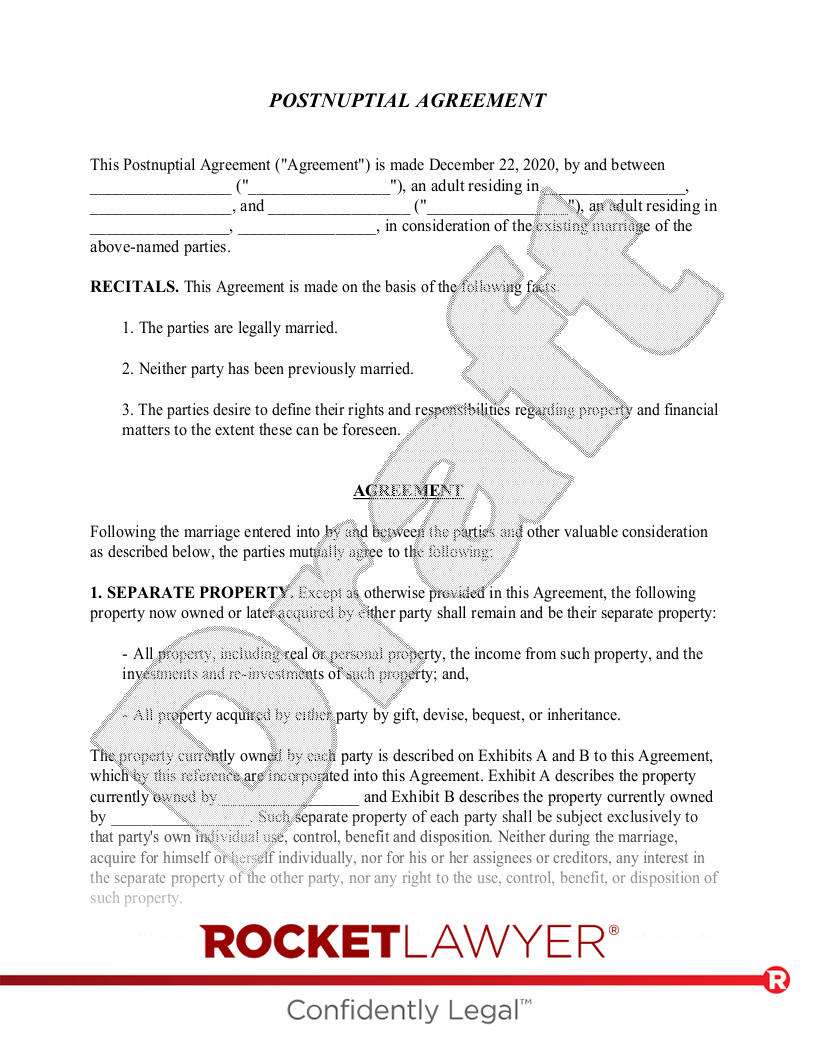How do you keep assets separate in a marriage?
When a couple files for divorce, asset division is a complex and frustrating process. Married couples can avoid this draining experience with a Prenuptial or a Postnuptial Agreement. These contracts detail who gets what in the event of divorce, but may also detail how separate property is handled during the marriage.
Here are three steps to consider to keep assets separate during your marriage:
- Keep detailed records of separate property.
- Keep separate property in separate accounts.
- Do not comingle or mix separate property with shared property.
A Postnuptial Agreement allows you and your spouse to list and agree to the assets you each would like to retain if the marriage ends. It can also clearly list out those assets that are separate property.
Do courts uphold Postnuptial Agreements?
Yes. Most Postnuptial Agreements are upheld by the courts. They are generally considered valid and enforceable if the document meets the following requirements:
- In writing: A valid Postnuptial Agreement must be signed by both parties, and state laws often require the agreement be witnessed.
- Both parties signed voluntarily: A Postnuptial Agreement will be considered void if there is evidence of coercion.
- Full disclosure of assets: A Postnuptial Agreement must fully disclose all assets, income, and liabilities.
- Impartial and fair agreement: The agreement may not stand up in court if there is evidence that the contract was unfair to one spouse or openly one-sided.
What assets should be included in a Postnuptial Agreement?
A Postnuptial Agreement generally includes the same clauses you find in a Prenuptial Agreement. The document you sign after marriage has various provisions that improve outcomes in divorce. Often dividing assets can be contentious. Including the following can help make the division of assets and divorce a simpler process:
Marital assets: The agreement separates shared assets acquired during the marriage which are considered marital property, such as investments, business assets, bank account balances, real estate, vehicles, and more.
Separate property provision: The provision allows either party to keep the assets they acquired before the marriage. It also identifies assets one spouse acquires during the marriage as personal property that may not be subject to division during divorce.
Spousal support: If one spouse leaves employment to become a stay-at-home parent or seek education for better employment opportunities, the provision spells out how much spousal support the party will receive during and after the marriage.
Child support: Although this agreement may not override state law, it may ease the transition. This provision may also handle the support of children from a previous marriage, and child support in case of divorce.
What must be excluded from a Postnuptial Agreement?
State laws dictate what can and cannot be included in a Postnuptial Agreement. Some terms may be unenforceable. Here are some provisions that most states will not recognize in a Postnuptial Agreement:
- Child custody decisions: In the event of a dispute, the courts may rule which parent is fit to live with a child and the financial support that is in the best interest of the child.
- Waivers of alimony rights: Most states restrict a spouse's ability to forego alimony.
- A clause encouraging divorce: Any provision that may appear to offer a financial incentive for divorce may jeopardize the Postnuptial Agreement.
- Inclusion of personal information: A postnuptial agreement should only cover finances and property.
- Illegal activities or assets.
Do Postnuptial Agreements expire?
Like most legal agreements, it depends on the specific terms. A couple can insert a sunset clause which terminates the agreement after a period of time. In these situations, initially, asset division may favor the more affluent spouse. After the Postnuptial Agreement expires, if the couple then divorces, the agreement would not apply and assets would be divided as they would under state law.
Without an end date, a Postnuptial Agreement's lifespan depends on the marriage. However, if a couple fails to abide by their agreement during the marriage, such as by mixing their separate and shared property, then parts of the agreement may not be upheld. This may result in separate assets becoming shared assets and subject to division.
If you have legal questions about making or entering into a Prenuptial or Postnuptial Agreement, reach out to a Rocket Lawyer On Call® attorney for affordable legal advice.
This article contains general legal information and does not contain legal advice. Rocket Lawyer is not a law firm or a substitute for an attorney or law firm. The law is complex and changes often. For legal advice, please ask a lawyer.
